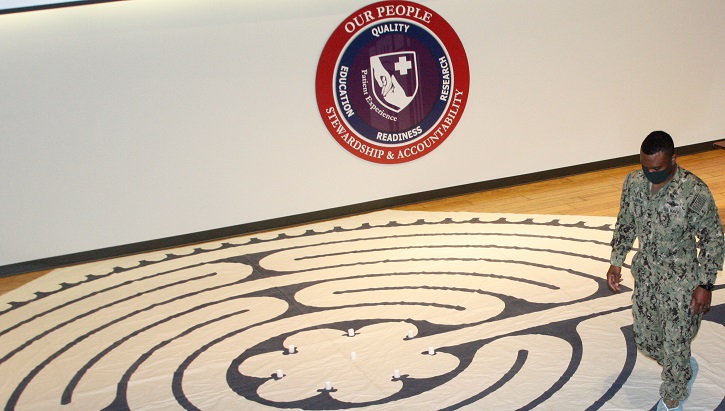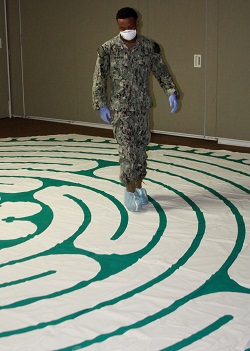
Building Your Mental Health Through Resiliency

Navy Chaplain Assistant Petty Officer 2nd Class Oral Fullerton walks a labyrinth in the Clark Auditorium at Walter Reed National Military Medical Center May 20. Sponsored by WRNMMC’s Department of Pastoral Care, labyrinth walks provide participants time for reflection, meditation and helps to build resiliency and mental health.
This year’s observance of Mental Health Awareness Month during May coincided with one of the most complex challenges in recent history — combating the COVID-19 global pandemic, which has caused loss of life, physical suffering, mental and emotional hardship.
Army Col. (Dr.) Wendi Waits, director for Behavioral Health at Walter Reed National Military Medical Center, defined mental health as, “Having the mental ability to interpret and respond appropriately to stressors, to weather the storm, so to speak.”
“There is significant evidence in the medical literature that the way we think influences the way we feel, which influences the way we behave or react,” she explained. “So being able to think about things from a different perspective is critical. When I am stressed, for example, I always think about the fact that someone else has it worse, and I also think about all of the things I have to be grateful for. For example, I may have been working 14-hour days last month, but I had a steady paycheck, a healthy family, and weekends to recover. Not everyone can say that, and many people with greater stressors than me are still managing to endure. That type of thinking really helps me out.”
Waits added gratitude journals have also gained popularity for this reason, “especially if people aren’t naturally accustomed to thinking about what they have to be grateful for. Jotting down three things a day that you are grateful for can help you ‘hunt the good stuff’ and put a more positive spin on life. Sometimes adjusting your thinking can be difficult though, especially when the body’s ’fight, flight, or freeze’ mechanism has kicked in. For this reason, activities that train the body to relax, such as yoga and meditation, or that help ’burn off’ excess energy, such as cardio exercise, have also been proven to be very effective in reducing anxiety and depression.“
Waits offered other suggestions to help people to improve their mental well-being and handle stress include getting outdoors. “Try to break a sweat for 20 to 30 minutes every day, take a deep breath before reacting and take advantage of the many on-line resources that are available for counseling or learning new skills,” she stated.

Navy Seaman Devion Newkirk walks a labyrinth in the America Building’s (Building 19) Great Lakes conference room at Walter Reed National Military Medical Center May 20. Sponsored by WRNMMC’s Department of Pastoral Care, labyrinth walks provide participants time for reflection, meditation and helps to build resiliency and mental health.
Regarding those on the frontline in the battle against COVID-19, Waits stated, “Frontline work, for health-care providers and other essential personnel, is so challenging these days, but the above principles still apply. They should also consider the significant benefit they are personally bringing patients, co-workers and the public at large. Even the little things matter.
“I would also recommend using what we know about COVID to inform their thinking and behaviors,” Waits continued. “There is likely to be asymptomatic transmission, but if everyone is wearing a mask, washing their hands, and not touching their face, then the risk of getting infected is extremely low. Even if one does acquire COVID, the risk of admission to the hospital is extremely low.”
Concerning children, Waits said kids of all ages look to their parents for safety and security. “The less in control you appear, the less in control they’ll feel. So do your best to stay calm and positive. Kids will have questions and deserve answers, but it’s important to give answers that kids can understand and that are as unlikely as possible to frighten them. Younger kids worry about the health of others, so you may want to emphasize how important it is for them to follow mask and hand-washing guidance so they don’t make their friends or family members sick.” She added that explaining to younger children what is going on in the news at a level they can understand it is important.
“Teenagers have independent access to news, so you shouldn’t sugar-coat the information as much,” Waits continued. “Make sure they understand the potentially high rate of asymptomatic transmission. Anxious teenagers would benefit from a more cautious approach – sharing the data above about who is at greatest risk, and possibly engaging them in gratitude or volunteer work to give them something to do besides worry about COVID.”
Waits added there are many types of mental illnesses, ranging from mood disorders such as depression and bipolar illness, to anxiety disorders, psychotic conditions, attention disorders cognitive disorders and personality disorders. “They frequently occur together and can sometimes be tied to an underlying medical condition, vitamin or electrolyte deficiency, infection, metabolic process, etc. It’s important to seek a professional’s opinion if self-help methods are not working to address the problem,” she stated.
“Mental Health Awareness Month is an important reminder of the prevalence of mental illness and the resources to address it,” Wait furthered. “Nearly one-third of American adults will develop a mental health condition at some point in their lives and exposure to traumas and other negative life events can raise one’s risk. However, we have come a long way in understanding mental illness, psychological health, resilience and best practices to ensure everyone is functioning on the top of their game. This month provides a nice annual landmark to get the word out about the latest advancements,” she concluded.
The National Suicide Prevention Lifeline, which provides 24/7 free and confidential support for people in distress, prevention and crisis resources and best practices for professionals, is available at 1-800-273-TALK (8255); 1-888-628-9454 (Spanish); and TTY at 1-800-799-4889 (4TTY).





















.png)












No hay comentarios:
Publicar un comentario